The River Severn and the Wye are at risk of becoming “dead zones” because regulators and enforcement agencies have been “asleep at the wheel for decades”, according to Gloucestershire civic chiefs.
The scathing comments directed at the Environment Agency and Ofwat came as Forest of Dean District councillors backed the creation of an action plan and called for a crackdown on river pollution in the two rivers.
Populations of salmon have fallen by 75 per cent across the globe with eels and elvers at risk of becoming extinct in the Wye and Severn, according to those calling for action.
Councillor Andrew McDermid,, who put forward the motion at a meeting in Coleford on May 30, said it is about reversing the progressive destruction of the Severn and the Wye, estuary and the coast.
“We are looking at the endgame of dead zones in these rivers due to the impact on them of various different types of pollution,” he said.
“Top of the list is farming run-off, pesticides and fertilisers, that’s 40 per cent, it is reckoned.
“Secondly, untreated sewage is 35 per cent and road run-off is 18 per cent. Plus now we’ve got a more modern form of pollution down to pharmaceuticals and microplastics.”
He said nobody is unaware of the public outcry over the sewage outflows “unchecked by the regulator the Environment Agency”.
A recent survey by the Soil Association found that 15 per cent of the public were unaware that farming was the biggest polluter of the country’s rivers, he said.
“Some 80 per cent underestimate the proportion of chickens that are factory farmed and yet 75 per cent say they would eat less chicken in order to prevent the environment’s destruction.”
Cllr McDermid told the meeting that, according to The Wildlife Trusts, ten per cent freshwater species are heading for extinction.
His motion said the council is witnessing the pollution of rivers from farm and sewage runoff and that the Severn has been identified as the worst river in England for sewage pollution while the Wye is already classed as “unfavourable-declining”.
Councillor Alan Preest suggested writing to the Environment Agency which is responsible for water quality in the River Severn and Wye to seek their view on the situation.
However, cabinet member Sid Phelps who spent decades working in the water industry and the Environment Agency, asked members to temper their expectations.
“The whole country is infuriated with the state of the water companies and run off from some farming practices,” he said.
“The Environment Agency are part of the problem along with the other lacklustre regulator Ofwat who have both been asleep at the wheel for the last 35 years since privatisation which this is why we are in this pickle.
“By all means write to the Environment Agency but don’t expect too much.”
The council voted unanimously in favour of the proposals.
In April this year, Government plans were announced to better protect and preserve the River Wye for future generations, including up to £35 million in funding and the appointment of a new ‘River Champion’ and taskforce.
Marc Lidderth, Area Director for the West Midlands, Environment Agency said the River Wye is a beautiful and important part of the UK’s landscape, resources and community wellbeing.
He explained it was introducing a wide-ranging plan which allows it to capitalise on its work already underway with partners, local farmers and environmental groups to tackle the decline in water quality in the catchment.
Ofwat agrees that water and wastewater companies’ performance on the environment is simply not good enough, and they need to go further, faster.
“Where companies fall short, Ofwat acts – over recent years, we have imposed penalties and payments of over £300 million and in November 2021, we announced our biggest and most complex investigation into all companies’ management of sewage treatment works in England and Wales, with live cases into six companies,” a spokesperson said.





Comments
This article has no comments yet. Be the first to leave a comment.